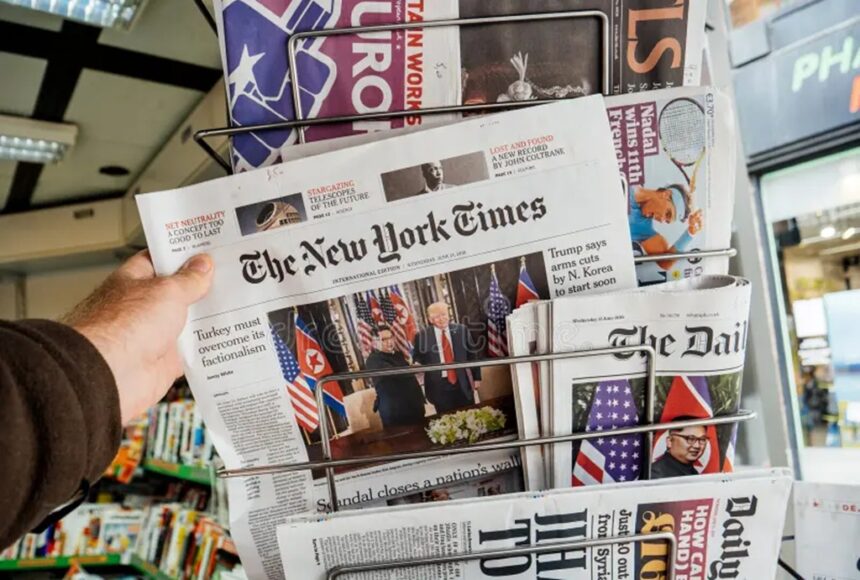BANGKOK – Concerns continue to grow about the Chinese Communist Party’s (CCP) sway over U.S. corporate media. Reports suggest that Beijing uses business deals and partnerships to guide coverage inside American newsrooms.
With claims that some progressive media groups have received money from Chinese sources, the situation has stirred debates on national security, fair reporting, and the impact of foreign influence in American politics, especially in how some stories reflect anti-Trump views and support Democratic Party interests. As trust in corporate media drops and financial pressure builds within the industry, the effects of such influence could be serious.
Chinese state media outlets like China Daily and Xinhua News Agency have paid millions to major U.S. publications, including The Washington Post, The Wall Street Journal, Time, and The Los Angeles Times, for sponsored content that sometimes looks like regular news.
Official records from the U.S. Justice Department in 2020 show China Daily alone spent over $4.6 million at The Washington Post and nearly $6 million at The Wall Street Journal since late 2016 for such space. These paid features, often tagged as “China Watch”, push China’s view on trade, human rights, and global leadership and tend to miss or downplay critical reporting on the CCP.
Critics worry that these money ties affect the freedom of newsrooms. As some outlets struggle to stay afloat, they may hesitate to report harshly on China to keep these contracts.
Reports have also highlighted a content-sharing deal between the Daily Mail and the CCP’s main newspaper, People’s Daily. This relationship prompts questions on whether money pressures could quietly shape stories to reflect Beijing’s views.
Progressive Media and Suspected China Funding
There is ongoing concern about progressive outlets and other groups in the U.S. taking funding from people or charities tied to Chinese firms such as Huawei, a company closely linked to the CCP.
According to an investigation by New Lines magazine, some American far-left groups in recent years have received money from such sources. These funds have supported messaging that fits Beijing’s interests, such as arguing against accusations of human rights abuses in areas like Xinjiang.
Clear proof that these outlets accept direct payments from Chinese state media to deliver an anti-Trump message is rare. Still, the way some stories overlap with CCP talking points raises questions.
Some left-leaning platforms paint U.S. policies in a negative light while casting China in a better role. This pattern has led to claims that China’s financial support may be tied to a rise in anti-Trump rhetoric, as Beijing has often viewed Trump’s economic and foreign policy stances as threats.
During the COVID-19 pandemic, major broadcasters like CNN, NBC, CBS, and ABC were criticized for giving little attention to China’s response to the outbreak while mainly focusing on Trump’s actions.
A Media Research Center analysis found only a few minutes out of hundreds devoted to virus coverage tackled China’s government directly. This selective focus has left many wondering if income from Chinese sources guides how newsrooms decide what to cover, especially in left-leaning media.
Anti-Trump Narratives and Chinese Influence
China has pushed for a softer U.S. administration for some years. Research shows that social media accounts tied to China tried to spread both pro-Trump and anti-Biden posts during the 2020 election, pointing to efforts to stir division or favour outcomes good for Beijing.
Since Trump’s return in 2025, Chinese state media like Global Times have welcomed moves against U.S.-funded outlets like Voice of America, branding them as hostile to China.
This situation shows a layered relationship. Beijing may not like Trump’s policy approach, but it profits from a divided U.S. media climate. This overlap between some U.S. outlets’ anti-Trump tone and CCP propaganda has led to claims that progressive platforms may, knowingly or not, help push China’s agenda.
Reports linking U.S. media companies and Chinese funding suggest such ties could explain why some outlets go soft on China’s human rights issues while criticizing Trump’s stance on trade. Yet proof connecting these financial arrangements directly to anti-Trump coverage remains thin. Many urge caution when linking the two without clear evidence.
Security Concerns Linked to Beijing’s Influence
The CCP’s reach into media circles has set off alarms about U.S. security. The FBI calls China’s efforts in information and economic espionage a “grave threat” to the country’s values and its economy. Methods like data collection, censoring news, or secretly buying stakes in foreign outlets give Beijing tools to shape opinion and silence criticism.
A Freedom House review noted that Chinese state media still gets its content to American audiences through paid inserts and even radio broadcasts, which may nudge public views.
Control of messaging platforms such as WeChat has also led to the silencing of Chinese-American voices talking about U.S. politics, making many wary about outside interference in homegrown debates. The U.S. State Department warns that these moves might shrink freedom of speech worldwide and chip away at democratic traditions.
The CCP’s growing presence in U.S. media comes as many news companies face dwindling audiences, job cuts and competition from new independent sources. This tough climate makes old-guard outlets more open to outside money, including deals with Chinese state media.
The Hoover Institution points out that China has largely wiped out independent Chinese-language media in America by either forming partnerships or overwhelming them, centralizing its message to Chinese-Americans.
The Need for Openness and Caution
As these pressures mount, major media firms rely more on funds from overseas, making them more open to influence from countries like China. With public trust at record lows, driven by perceived slants and narrow reporting, this dependence speeds up the decline of corporate media’s standing in the U.S. People are more skeptical than ever, and with Beijing’s money in play, American journalism’s credibility is at risk.
Experts call for greater openness, including strict rules on reporting foreign money and tougher enforcement of the Foreign Agents Registration Act (FARA) for outlets like CGTN and Xinhua. Strengthening independent Chinese-language media and reviewing platforms like WeChat for censorship remain key actions.
As the U.S. faces these challenges, the mix of foreign pressure, partisan rifts, and media vulnerability needs clear attention. While claims about direct CCP funding of anti-Trump messaging in the press lack solid proof, China’s growing hand in American media still threatens both national security and the truthfulness of the country’s news.
Disclaimer: Some claims about specific motivations or direct links rely on limited evidence and should be treated as unconfirmed.














